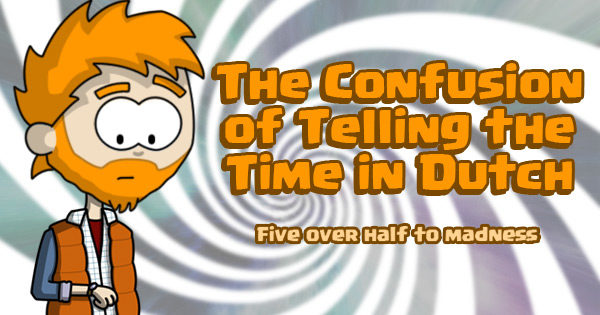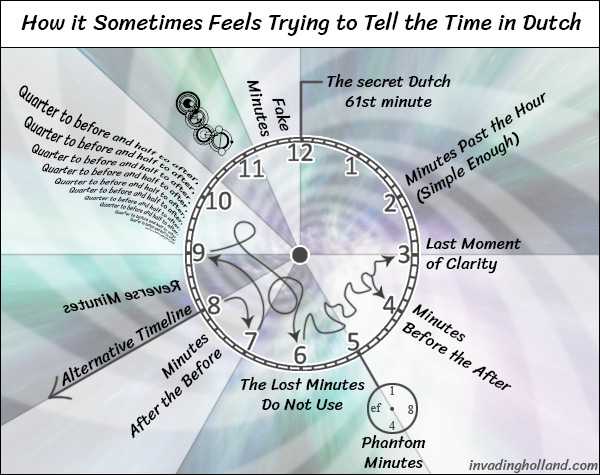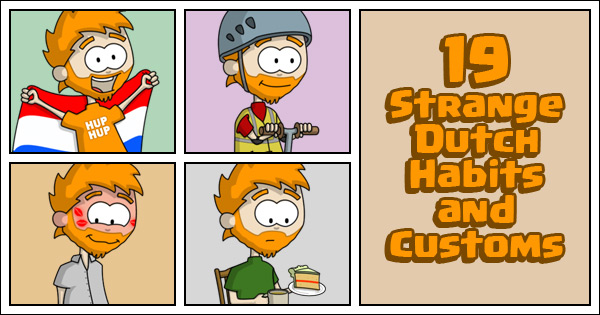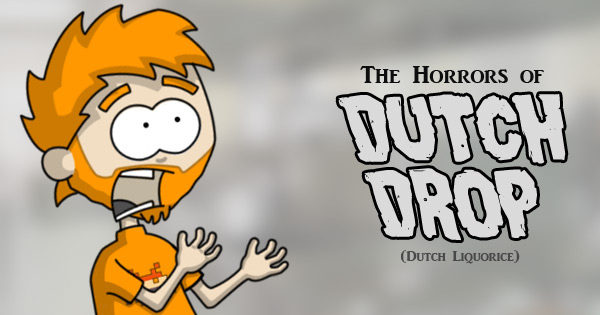The Confusion of Telling the Time in Dutch

When the Dutch were developing their language they knew they wanted it to be as complex as possible. It would be a point of pride for them that their language was one of the hardest in the world to learn.
For the most part, they succeeded in their goal. Dutch is a very difficult language to master. However, the difficult words, the weird letter combination sounds, the unfamiliar sentence structure and even the mysterious use of ‘de’ and ‘het’ are all challenges that can eventually be overcome given time. That was why the Dutch knew they needed something more complex, something that would continue to confuse even the most dedicated student of their language.
It was while seeking this new linguistic challenge that the Dutch had an idea. What if a part of their language required more than the translation of mere words? What if it required the translation of an entire concept? The very concept of time itself. What if they made the Dutch system for telling the time as complex as possible?
Hour Makes an Hour’s Difference
Imagine that you are not Dutch but you have arranged an important appointment with a Dutch person for ‘half acht’ (half eight). It could be a business meeting, a doctor’s visit, or even a date. Being a punctual person you set your alarm early. After you’ve woken up, showered, got dressed and eaten breakfast you leave the house with time to spare. Your journey goes smoothly and you arrive at the appointment location on time…
Then something strange happens. As you wait you discover a text on your phone from an hour ago. It’s from your Dutch business partner/doctor/date. In the text, they inform you (with an annoyed tone) that you never showed up for the appointment at half eight. You check the nearby clock on the wall and it is clearly pointing to half eight. Confused, you wonder if you’ve started to lose your mind or if you’ve fallen victim to some weird time anomaly. However, neither of these is the case. You’ve simply fallen victim to the Dutch system for telling the time.
In English, if someone says ‘half eight’ they mean half past eight (8:30).
However, if a Dutch person says ‘half eight’ they mean half to eight (7:30). The exact same numbers are said in the exact same order but there is a difference of an hour. If you are not careful this difference can easily catch you out (like it has with me many, many times before).
X Minutes Past Half To Y Hour
Things start to get even more complex when dealing with the few minutes either side of the half-hour. Suddenly the Dutch start talking about the minutes past the half an hour to the hour. It’s confusing even without the additional layer of the language barrier. You end up mentally jumping back and forth around the clock as the English ‘twenty to eight’ suddenly becomes the Dutch ‘ten past half an hour to eight’.
It’s at this point that asking a Dutch person the time and actually understanding their answer becomes an incredibly difficult task. Their reply must be carefully deconstructed, analyzed and put back together piece by piece. If you are not careful you can become stuck in a confusing loop of ‘five to half over nine to quarter to six to eight over nine divided by two’ or similar.

Trying to convert time given in Dutch into your own language is like trying to solve a complicated mathematical equation or attempting to crack a secret cypher. If you are not Dutch a degree in quantum physics is needed just to arrange an appointment (and show up to it at the right time).
If you didn’t grow up with it, trying to understand the Dutch system for telling the time is like staring into the abyss of insanity. To be fair it’s probably the same if you are Dutch trying to understand the British system. It’s amazing that Dutch and British people are ever able to meet up.
In the end, it’s probably just easier to calculate the time using the suns position. Better still, simply forget the whole concept of time altogether and never look at a clock ever again.












I’m guessing the “half eight” debacle arises from the British insisting on having their own timezone. If you would have stuck to the British timezone, you would have arrived on time ;-)
Forget that.. You’d have arrived two hours late. You’re right, it is a mess ;-)
Fortunately for me, having grown up speaking German, half eight—halb acht— is also 30 minutes before the hour. I just subscribed: this is all too fabulous!
Do they ever use the 24hour clock?
I’ve had this problem with British business partners, luckily I figured it out before an error arose. Actually, they agreed with me that “half 8”, being LESS THEN 8, makes more sense then it being a shorthand for half past 8. So the joke is on you…
Yes. Clocks like in my wife’s car are set to show 24 hours because that’s what they do.
Since we live in the US, this never comes up. But when I’m in the NL, it’s something I have learned. It doesn’t come easy or naturally, but it’s something you learn pretty quick if you want to know the correct time. I never made an appointment, but if I asked the time and someone said “half eight” it would be a little confusing because I didn’t think it was late enough to be 8:30.
This was an excellent article of confusion in interpretation of how different countries look at time. You can see why the military over the world use military time which is the 24 hour clock. However make sure you’re in the same time zone?
Love this, Stu. As you say, a recipe for confusion! I made this mistake too more than once in the early days. I’m used to it now, of course, but it still takes a mental switch. Your diagram is brilliant! I love it ?
Kinda goes along the line of:
Viswinkel – fish store – they sell fish
Shoenenwinkel – shoe store – they sell shoes.
Nachtwinkel – errrr? Night store – they sell …???
(my Mrs. pointed this one out to me…)